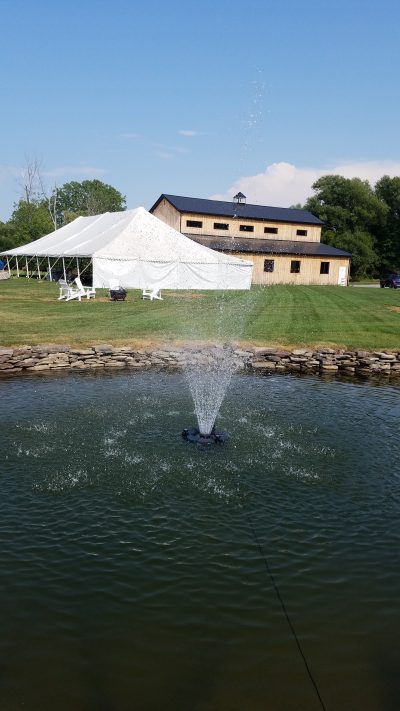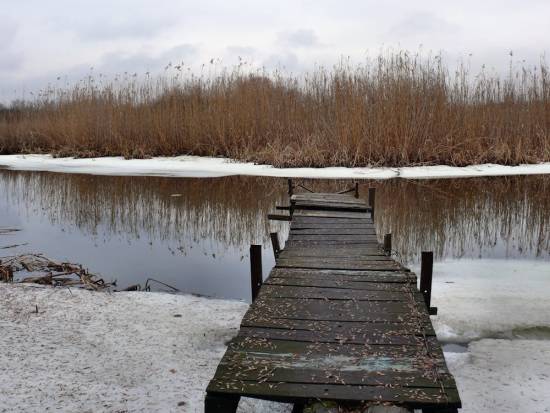Mitigating Pond Fish Stress in Hot Weather
Pond fish, like koi, goldfish, and other species, rely on stable water conditions to stay healthy. During hot weather, the water temperature rises, which can decrease oxygen levels and increase the growth of harmful bacteria and algae. These factors contribute to pond fish stress in hot weather. In Central New York, when the water temperature rises too high, fish can become lethargic, stop eating, and even develop illnesses due to weakened immune systems.
In general, pond fish are most comfortable when the water temperature is between 65°F and 75°F. Anything above 80°F can lead to stress, and temperatures above 90°F can be life-threatening if the water quality is not properly managed.
Keep the Water Oxygenated
 One of the most important things you can do to mitigate pond fish stress in hot weather is to ensure your pond remains well-oxygenated. As water temperatures increase, oxygen levels naturally decrease, making it harder for your fish to breathe. This lack of oxygen can cause your fish to appear sluggish, struggle to swim, or even float near the surface.
One of the most important things you can do to mitigate pond fish stress in hot weather is to ensure your pond remains well-oxygenated. As water temperatures increase, oxygen levels naturally decrease, making it harder for your fish to breathe. This lack of oxygen can cause your fish to appear sluggish, struggle to swim, or even float near the surface.
To address this issue, consider installing a high-quality aeration system. Aerators help circulate the water, allowing oxygen to reach deeper areas of the pond. You can also use a pond fountain or waterfall to increase surface agitation, which promotes oxygen exchange. If you notice that your pond fish are spending more time near the surface of the water, it’s a clear sign that they may be struggling to get enough oxygen.
Monitor and Maintain Water Quality
In hot weather, the conditions in your pond can change rapidly, leading to poor water quality. Excess nutrients in the water can fuel algae growth, creating murky water and depleting the oxygen supply. Harmful bacteria and toxins can also thrive in these conditions, further stressing your fish.
Regular water testing is essential to maintaining a healthy pond environment. You should monitor parameters such as pH, ammonia, nitrite, and nitrate levels to ensure they stay within safe ranges. If you find that the water quality is slipping, consider performing a partial water change. Removing a portion of the warm water and replacing it with cooler, fresh water can help to regulate the temperature and improve oxygen levels.
Provide Shade and Shelter for Your Fish
During the hottest days of summer, the direct sun can significantly raise the temperature of your pond, leading to even more stress for your fish. Providing shade is one of the most effective ways to help reduce pond fish stress in hot weather. There are a few ways to achieve this.
If your pond is located in an open, sunny area, you can install a shade net or aquatic plants like water lilies and water lettuce, which provide natural shade. These plants not only offer cover but also help absorb excess nutrients, preventing algae blooms and stabilizing water quality. Additionally, floating platforms or structures can provide shelter for your fish, giving them a cooler place to retreat when the sun is at its peak.
If your pond is surrounded by trees, the shade from branches will naturally help regulate the water temperature. However, be mindful of fallen leaves, which can accumulate and decay in the water, affecting both water quality and oxygen levels.
Adjust Feeding Habits and Reduce Stress Triggers
In hot weather, fish are generally less active and may have a reduced appetite. Overfeeding during this time can lead to uneaten food decaying in the water, which further contributes to poor water quality and increased stress on your fish. It’s important to adjust your feeding habits to match your fish’s needs during the hotter months.
Offer smaller, more frequent meals and ensure that all food is consumed within a few minutes. This not only helps prevent water contamination but also prevents overfeeding, which can worsen stress. Avoid feeding your fish during the hottest parts of the day, as they are less likely to eat and may struggle to digest the food in warmer temperatures.
Additionally, try to limit sudden changes in the pond’s environment, such as adding new fish or making significant alterations to the pond’s structure. These changes can be stressful for fish, especially during periods of extreme heat.
Maintaining a Healthy Pond Aquatic Habitat
Pond fish stress in hot weather is an issue that requires proactive care and attention to ensure the health and happiness of your aquatic friends. By keeping the water oxygenated, maintaining water quality, providing shade and shelter, adjusting feeding habits, and minimizing environmental stressors, you can create a more stable and comfortable environment for your fish throughout the summer months.
As a pond owner in Upstate New York, you know that the summer heat can be intense, but with the right maintenance and monitoring, your pond fish can thrive even during the warmest days of the year. If you’re unsure about how to manage your pond during the hot months, consider reaching out to a professional pond maintenance company for assistance and advice.


